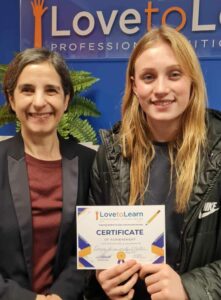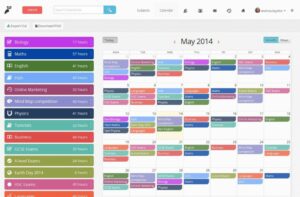Helping Confidence Bloom-A Case Study
Confidence
Eleanor’s mum said, “With the disruption during Covid, Eleanor lacked confidence in some subjects. I wanted to improve her self-belief in her academic abilities. Eleanor felt good about the free assessment and actually enjoyed it!
 Since enrolling, Eleanor says that the tutoring at I Love to Learn has given her more confidence to speak out in class, especially in maths. She is happy to ask questions during the sessions and the homework is a repeat of (some of)the lesson which helps her remember the learning.
Since enrolling, Eleanor says that the tutoring at I Love to Learn has given her more confidence to speak out in class, especially in maths. She is happy to ask questions during the sessions and the homework is a repeat of (some of)the lesson which helps her remember the learning.
“It’s Been Like Watching a Flower Bloom”
The greatest change in her, since coming to I Love to Learn, was her confidence in her own abilities. Slowly, after 3-4 months, she suddenly burst out having engaged with, and enjoyed, the creative writing at school, after they studied Macbeth. Ellie was so proud of her work that she brought it to show Linda. Fantastic! And the girl, that was always so negative about maths, has realised she can do it and now engages so positively in school. It has been like watching a flower bloom. Thank you so much. ” explained Eleanor’s Mum.
Top GCSE Revision Tips
How to Make Your GCSE Revision Awesome!

Effective study skills can often make good students into great students. Here are four great study habits to help your GCSE student get the most out of their learning potential.
- Study Planner- students will know the topics they need to give special attention to. A long term plan of the year ahead helps to avoid last minute cramming before exams.
- Study Schedule- regular study sessions on a timetable will make life easier as it becomes part of the daily routine.
- Study Time- designate a ‘communication blackout hour’ , no phones, messaging, gaming or TV.
- Study Space- create a study area away from distractions, ideally a quiet, well lit area, with materials to hand.
Understanding Your GCSE Exams
It is important to know what you are preparing for! For GCSE revision make sure you know; how many papers you will be taking in each subject, what topics will come up in each paper and which books to revise, for English Literature, for each exam. It is also helpful to know which exam board the school is using (it may vary between subjects) as it is helpful to be revising from the right past papers.
Make a Revision Programme

Make a plan to avoid the last minute rush! You don’t want to cram it all into the last minute. The best way to learn is to give yourself enough time to prepare for each subject. So, say you are taking five exams, you might schedule 10 hours of revision for each subject, so you need to find 50 hours worth of revision from somewhere! If you revise 2 hours every night that is achievable in a month. Some exams will need more revision than others, so it is important to plan accordingly for each one. You might have birthdays or other events that take up time, so make sure important dates are on your calendar and work round them. You also don’t want to be starting too early, although if you do, you can always plan to go over things again nearer the time.
Only Do Effective and Efficient Revision

Don’t over do it! Revision is hard and it is easy to get distracted. I found 2 hour blocks were the best with a short tea break. If you revise for long periods you tend to lose focus and time waste. Give yourself a reward at the end to look forward to.
Don’t just read your notes or the revision book. Make notes, revision cards are great, and sumarise what you need to know. With some subjects, such as History or Geography, you may be able to reduce your notes to a couple of pages of A4 paper. Other subject like languages you may need to produce flash cards and posters. I would always try to get my answers down to a single MNEMONIC (e.g. Richard Of York Game Battle In Vain for the colours of the rainbow). This meant I only needed to remember the Mnemonic and not all the causes of the First World War (Militarism, Imperialism, Alliances, Nationalism e.g. Meat Is Always Nice) or whatever the topic is.
When you have produced your notes, mnemonics or posters or whatever, you will then be able to use them for reminders and last minute revision nearer to the exam. This gives your brain the best chance to remember what you are revising as the information is repeated in several different ways.
Set Up a Dedicated Learning Environment
An important part of revision is having a dedicated place to study. This will need to be away from electronic distractions if possible! Leave the phone downstairs, turn the play station off, open the books and make some notes. Although the internet is amazingly useful for revision purposes, it is also amazingly distracting. I would suggest only allowing yourself a limited time to use the internet to revise, and then make sure you write it all down. It is too easy to find yourself watching TikTok or playing a PC game otherwise.
Use the Best Revision Resources
There are lots of excellent revision resources available on the internet for free now. I would also recommend revision work books which you need to fill in (writing the answers in full is what you will do in the exam). For subjects like maths or languages, these may be the best way to make sure you have sharpened your skills in all the areas needed. Good revision guides are also helpful for specific books that you need to know for English Literature. Revision books may also be useful if you have gaps in your own notes that you need to fill in.
Last But Not Least!
Eat well, get fresh air and sleep well. You brain is the organ that uses the most energy in your body. Energy comes from; eating good food, breathing plenty of oxygen and then resting, our brains need to recover. Don’t stop your sport/dance/exercise programme completely, even if you have to cut down, do try to keep these activities going. Make sure you get regular nutritious food (otherwise your stomach will be distracting you anyway, without you knowing), drink plenty of water and cut out the late night TikTok/Playstation/TV action!
‘Academic Scholarships From Two Schools’
“She Begged Us to Continue!”
Recommended by Friends
 We were recommended the ‘I Love To Learn Summer School’ by some friends who had used it previously, so we signed up both our daughters for the week at the Summer School in August 2020 which they both loved.
We were recommended the ‘I Love To Learn Summer School’ by some friends who had used it previously, so we signed up both our daughters for the week at the Summer School in August 2020 which they both loved.
Free Assessment
Before joining the summer school, Daisy was assessed at I Love to Learn to ascertain the level of work she should be given. Some significant gaps in her knowledge were identified as a result of the lockdown.
Academic Scholarships
She absolutely loved the tuition sessions, and never moaned about going or about doing her homework. She thrived with the individualised teaching and quickly caught up on the missed Y5 curriculum and dived into the Y6 work in greater depth. She worked hard and her efforts were rewarded with offers of academic scholarships from two local independent schools. The education, support and encouragement she was given undoubtedly helped with her preparation for the 11+ exam.
She Begged Us to Continue!
We had planned to stop the tutoring after the 11+ exam, but with the next lockdown and more disruption to her education, we quickly relented when she literally begged us to continue going! The sessions are adjusted to her needs and she describes them as ‘really fun’ and she likes it that the work is specific to her level and much more individualised than the class work at school. She gets on brilliantly with all the tutors and has blossomed academically with the attention and direction she has been given at I Love to Learn.
We felt the investment in her education was undoubtedly worth it. We whole heartedly recommend tutoring at I Love to Learn.
How Qualified Does A Tutor Need To Be?
Is Your Tutor Qualified?
 The short answer is, not at all. Anyone can call themselves a tutor without any qualifications or experience. It is up to parents to ask and decide what qualifications they would prefer. Well-qualified tutors, with classroom experience and a proven track record, are, of course, desirable. However, for highly motivated students, someone who is enthusiastic about their subject but not a qualified teacher may be a successful tutor. Generally, for children who are falling behind or have special needs, parents should actively seek tutors who possess specific skills tailored to their needs. This can often be achieved through the tutor’s experience working with similar cases or in specialized areas. It is important to note that while qualifications and experience are typically important benchmarks, a tutor’s dedication, passion, and ability to connect with the student on a personal level can also significantly contribute to successful tutoring outcomes. Therefore, parents should consider both the credentials and personal qualities of potential tutors when making their selection, ensuring the best fit for their child’s unique educational requirements.
The short answer is, not at all. Anyone can call themselves a tutor without any qualifications or experience. It is up to parents to ask and decide what qualifications they would prefer. Well-qualified tutors, with classroom experience and a proven track record, are, of course, desirable. However, for highly motivated students, someone who is enthusiastic about their subject but not a qualified teacher may be a successful tutor. Generally, for children who are falling behind or have special needs, parents should actively seek tutors who possess specific skills tailored to their needs. This can often be achieved through the tutor’s experience working with similar cases or in specialized areas. It is important to note that while qualifications and experience are typically important benchmarks, a tutor’s dedication, passion, and ability to connect with the student on a personal level can also significantly contribute to successful tutoring outcomes. Therefore, parents should consider both the credentials and personal qualities of potential tutors when making their selection, ensuring the best fit for their child’s unique educational requirements.
Qualifications to look out for:
Degrees such as BSc (Science Degree), BA (Arts Degree), MA (Advanced Degree), PhD (Very Advanced Degree).
Teaching Qualifications, PGCE (Teaching Qualification), BEd(Education Degree), GTP (On the Job teacher training) -These all lead to if teachers complete a Newly Qualified Teachers year of experience (NQT) QTS (Qualified to teach in UK schools),
Many private tutors have qualified teaching status (QTS) although you don’t need to be a qualified teacher to be a private tutor. Some teachers tutor as a sideline to their classroom teaching job and some become private tutors after retirement.
Rest assured that, at I Love to Learn Professional Tuition, all our tutors have a teaching qualifications (QTS) and lots of classroom and tutoring experience. We give full training and our centres are all OFSTED registered. We are also members of The Tutors’ Association which is a professional body.
Help, It’s Homework Time?
The Joy of Homework

At some point most parents encounter the problem, or joy, of homework. So what, if anything, can we parents do to help?
Here are some practical tips on how to support children when they ask for help.
- Set aside a time each day for family learning.
Set aside at least 30 minutes, devoted to “family brain cell development.” During this time, there should be no mobiles, video games, computer games, etc.
Model your own excitement for learning by reading a book, writing letters, etc.
Your child may learn by doing their homework, reading about something they love or writing stories, etc.
- Help only when your child truly wants it.
Some parents make the mistake of forcing help upon their kids. This only creates frustration, anger, and kids who believe they can’t learn without their parents’ help.
- Help only when there’s an absence of anger or frustration.
When either you or your child gets frustrated or angry, learning becomes associated with frustration and anger.
If this happens it may be time to get professional help.
- Help only when your child can describe what the teacher said.
This ensures that your child continues to believe that it’s important to pay attention to teachers.
Unfortunately, some kids learn that it’s best to “tune–out” at school and let their parents do all of the teaching at home.
- Move away from your child before he/she “gets it.”
Some children believe they can only learn something, or “get it,” when an adult is in the same room…or is guiding them every inch of the way.
To prevent this dependency, avoid falling into the habit of sitting at the table as your child does their homework, especially when they are on the brink of learning something new.
- Reward progress and completion of homework, reinforce positive effort.

A hundred years ago homework usually meant memorising dates, texts and tables. As time went by homework went out of fashion and was even frowned upon as preventing children from taking part in social or sporting activities.
However, ideas about how the mind works and the best ways to educate young minds have continually been challenged and changed over time.
- Here to stay
One thing is certain, homework is here to stay and it does benefit children when monitored and set correctly.
Teachers still give homework to children to help them remember important facts but it is also given to help them develop study skills which they can use long after they leave school.
Congratulations To Our 11+ Exam Students
Well done to everyone who took entrance exams this January. All of you got an acceptance, bursary or even a scholarship with the school of your choice. Special mention to Teyona, Daisy, Kyle, Daniel and Iyaad, what a fantastic effort! You have all worked very hard during this difficult time so you should be very proud of yourselves.
How Much Should You Pay for Tutoring Per Hour?
What Should You Pay a Tutor Per Hour?
According to prospects.ac.uk tutors in the UK charge from around £30-£42 per hour in 2022. Of course all of this will depend on a great deal? Is the tutor qualified? Does the tutor have experience with children? What qualifications does the tutor have in the subject and what exams (if any) is the child working towards? It would be quite normal to pay £50 per hour for GCSE tuition and much more than that for the best 11+ tutors in London say! (Tutorfair.com have prices of over £100 per hour for specialist 11+ tutors/entrance exam tutors)
Fees at I Love to Learn Professional Tuition
The good news it that at I Love to Learn we provide tuition by fully qualified and experienced teachers. All our tutors are fully trained in our bespoke education system providing excellent results. Each 80 minute lesson is charged at £37.00 (£27.25 p/hr) across all payment methods and session numbers.
Funding Help for Working Parents
We know that may hard working parents are committed to their child’s education but find after school tuition expensive. You may be surprised to find that there are a number of ways to make it more affordable!

Childcare Vouchers:
If you have an employer, you may already use this scheme to pay for childcare. As we are an OFSTED registered centre you will be able to use Childcare Vouchers to pay us too.
Tax Free Childcare:
If you are self-employed or your employer does not have childcare vouchers, the government has provided a scheme for you. You can set up a Tax Free Childcare account for free, you get £2 from the government for every £8 you put in?
You can use these in the same way as childcare vouchers to pay us.
Go to www.gov.uk/get-tax-free-childcare to find out more.
OFSTED Registration Number: for the Portsmouth Centre is EY387054 and
Fareham Centre EY559164
‘Closing the Lockdown Learning Gap!’
Teach your child Handwriting-getting started
In this video I explain how to write lower case letters. At I Love to Learn Professional Tuition we teach cursive (or joined up) writing right from the beginning. I start with writing letters that begin with vertical strokes e.g. i, t, l, p and m This is suitable for parents wishing to help their child with the basics of joining up ( cursive) handwriting. However, it can also be used by all those who would like to improve their handwriting style.
Teach Your Child Fractions-Improper Fractions and Mixed Numbers
In this video I explain how to convert improper fractions into mixed numbers. This is a topic that can often cause confusion, mainly because of the terms being used. I suggest that it is usually helpful to draw a diagram of the improper fraction or mixed number that you are trying to convert.
This is suitable for parents wishing to help their child with topics they may have forgotten.
Click here to download the worksheets…..
To find out more about how we teach maths click here.
Help for Working Parents
Help for Working Parents
We know that may hard working parents are committed to their child’s education but find after school tuition expensive. You may be surprised to find that there are a number of ways to make it more affordable! All our centres are OFSTED registered which means that working parents may be able to use some of the below schemes to help pay for tuition.

Childcare Vouchers:
If you have an employer, you may already use this scheme to pay for childcare. As we are an OFSTED registered centre you will be able to use Childcare Vouchers to pay us too. Lots and lots of parents have been able to get help with payment. If you don’t use this already, you can ask your employer to pay some of your wages to a Childcare Vouchers provider. The advantage is that the charges are made before tax, saving you in effect 20% of the cost.
There are lots of chilcare voucher providers, and we are registered with many of them.
You may already have a childcare vouchers service, if not, ask your employer to help.
Tax Free Childcare:
If you are self-employed or your employer does not have childcare vouchers, the government has provided a scheme for you. You can set up a Tax Free Childcare account for free, you get £2 from the government for every £8 you put in?
You can use these in the same way as childcare vouchers to pay us.
Go to www.gov.uk/get-tax-free-childcare to find out more.
Universal Tax Credit
If you receive Universal Tax Credit you may be eligible for help also. Our advice is to call the helpline, tell them your childcare costs have gone up, and ask if they are able to help. Lots of parents have used this to help pay for after-school tuition and holiday schools. From time to time we are asked to provide evidence that the tuition has taken place.
The UTC Helpline is 0800 328 5644.
OFSTED Registration Number: for the Portsmouth Centre is EY2807143 and
Fareham Centre EY559164
Havant Centre EY2687393
Find out more about fee here….
Please do not hesitate to get in touch if we can be of any help about this or any other matter.
‘Tutoring Children to Learn and Love the Journey!’


